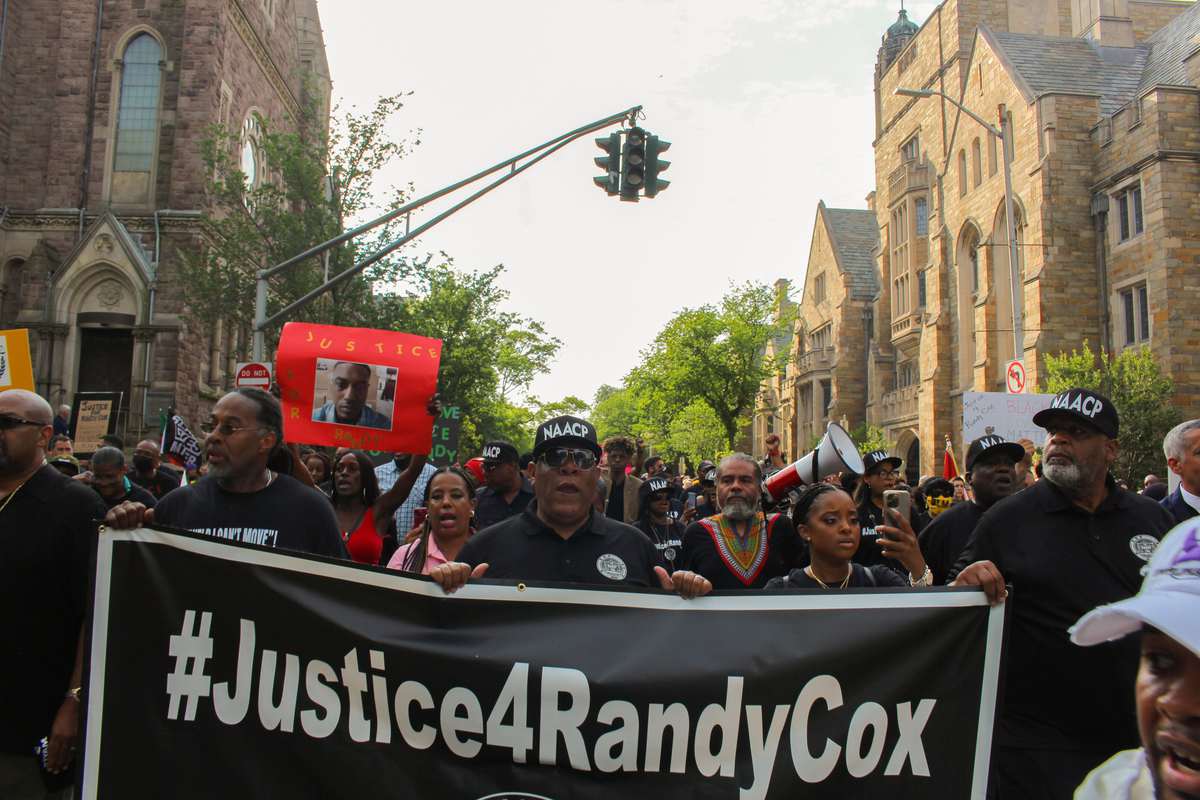Randy Cox case settles for historic $45 million, four New Haven officers fired
Almost a year after Randy Cox was paralyzed by New Haven police officers, the city settled his civil suit for a record sum.

Yash Roy, Contributing Photographer
Almost a year after Randy Cox was paralyzed by New Haven police officers, the city settled his civil suit for a record sum. Four of the officers involved were also fired for their conduct last June.
The city settled with Cox on June 9, almost exactly a year after he was paralyzed while being transported to the New Haven Police Department’s detention center following his arrest at a Juneteenth block party. The final sum is the largest settlement in a police misconduct case, surpassing the $27 million agreed to by the city of Minneapolis after police officers murdered George Floyd in 2020.
“We extracted every single cent that we could possibly extract from the city of New Haven so that Randy could live life the best he can based on his current condition,” Cox’s attorney Lou Rubano told the News. “But, again, there is no amount of money in the world that can justify these horrific injuries that he has sustained.”
The summer also saw long-awaited consequences for the officers involved in the case.
Two officers, Jocelyn Lavandier and Luis Rivera, were fired by the Board of Police Commissioners for their role in the arrest on June 7. Two more officers, Oscar Diaz, who paralyzed Cox while driving him to the station in a police van, and Sergeant Betsy Segui, were fired on June 28. The fifth, Ronald Pressley, avoided dismissal by retiring in January.
An internal affairs investigation released by the NHPD in March had found that the officers were reckless, lacked compassion and were in violation of both state law and numerous department policies.
As shown in body camera footage, police placed a handcuffed Cox in the back of a transport vehicle without seatbelts. They then drove 11 miles above the speed limit to the NHPD’s detention center after arresting him on June 19, 2022. The vehicle’s driver, Officer Diaz, abruptly braked en route near the intersection of Prospect and Grove Street. The resulting momentum flung Cox across the vehicle’s holding area and slammed him into its inner metal wall. Diaz later claimed this braking was necessary to evade a potential accident.
After checking on Cox and calling for paramedics, Diaz chose to continue driving to the detention center, violating NHPD policy. Once the vehicle arrived, Diaz and four other officers forcibly moved Cox into a holding cell despite his pleas for help. In one instance, Cox insisted, “I can’t move,” to which Lavandier replied, “You’re not even trying.”
Paramedics arrived 15 minutes later and took Cox to the Yale-New Haven Hospital.
A year later, the incident has left him permanently paralyzed. Cox suffered a cervical spine injury and fracture, his immune system has been compromised and he has a chronic and permanent respiratory condition. According to attorney Luo Rubano, his life expectancy was shortened by 15 years.
Rubano also estimated that providing Cox with basic day-to-day care for the rest of his life would cost a staggering $16 to $22 million.
Cox cited these injuries and costs in the civil lawsuit he filed against New Haven last October. The case, which was overseen by U.S. District Judge Maria Garcia of New Haven resulted in both parties agreeing on the $45 million sum to resolve all claims against the city of New Haven. Cox had initially sought $100 million in the lawsuit.
“Today’s settlement agreement is an important and sobering part of this accountability process,” New Haven Mayor Justin Elicker said at the time. “We trust that this settlement will allow him to receive the support and medical care he needs to move forward. The city of New Haven will continue to do everything we can to assist him in his journey.”
Of the $45 million settlement, $30 million will be covered by the city’s insurance and $15 million will be paid by the city itself.
Although the case was settled two months ago, only $20 million of the promised $45 million has been transferred to Cox’s family. About $20 million of the $30 million insurance proceeds has arrived. The other $15 million from the city will not be ready until October or November.
Cox is still in a West Haven facility receiving what Rubano described as inadequate care for his injuries. Rubano said Cox’s hope is to eventually use the settlement money to buy a home in the New Haven area equipped with around-the-clock care.
The firings ignited intense backlash from the Elm City Local Police Union, which represents NHPD officers.
“The Union is urging all members to proceed with the utmost caution in this post Police Accountability reality. A reality where they may be deemed ‘reckless’ just for doing their job,” the union wrote in a statement. “We will uphold our oath, but we cannot and will not do so by unnecessarily jeopardizing our careers or personal safety.”
For Cox’s family, the firings represented long-delayed accountability after almost a year of waiting. When the officers involved were charged with misdemeanors by the Connecticut state’s attorney last November, the family blasted the charges as being insufficient.
According to Elicker, the NHPD has made changes to the department’s conduct procedures since Cox was paralyzed.
“The New Haven Police Department has instituted a comprehensive set of reforms, updated its policies and procedures on the transfer of people in custody, and required department-wide training on duty to intervene,” Elicker wrote in a statement on June 9. “The officers involved are being held accountable by the police department and in court.”
Cox’s legal representation was led by nationally prominent civil rights attorney Benjamin Crump.







